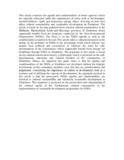Please use this identifier to cite or link to this item:
https://cris.library.msu.ac.zw//handle/11408/1383Full metadata record
| DC Field | Value | Language |
|---|---|---|
| dc.contributor.author | Mpofu, Phillip | - |
| dc.date.accessioned | 2016-05-18T13:01:18Z | - |
| dc.date.available | 2016-05-18T13:01:18Z | - |
| dc.date.issued | 2012 | - |
| dc.identifier.issn | I520-5509 | - |
| dc.identifier.uri | http://jsd-africa.com/Jsda/Vol14No4-Summer2012B/PDF/The%20Dearth%20of%20Culture%20in%20Sustainable%20Development.Phillip%20Mpofu.pdf3 | - |
| dc.description.abstract | This article examines the agenda and conditionalities of donor agencies which are typically subsumed under the euphemisms of terms such as development, women/children's rights and democracy among others, focusing on how they affect cultural sustainability and sustainable development in Zimbabwe. The article is based on the data gathered from selected cultural communities in the Midlands, Matabeleland South and Masvingo provinces of Zimbabwe which supposedly benefit from the programs conducted by the Non-Governmental Organisations (NGOs). The focus is on the NGOs agenda as well as the conditionalities attached to the aid. This article takes a cultural dimension to the debate on the problems of NGOs in the developing world which hitherto, has largely been political and economical. It valorizes the need for self-determination of the communities which supposedly benefit from foreign aid distributed through NGOs in Zimbabwe. The argument in this article is based on the cultural conservatism theory, a philosophy which is premised on the self-determination, autonomy and cultural freedom of the communities in Zimbabwe, Hence, the argument this paper raises is that the agenda and conditionalities of the NGOs in Zimbabwe are developed without the dialogic involvement of the community members such that they arc predetermined and judgmental. Considering the importance of culture in development, both as a resource and in defining the concept of development, the argument pursued in this article is that the prescriptive NGOs' agenda and conditionalities are inimical to cultural sustainability and ultimately sustainable development in Zimbabwe. This argument is premised on the preservation and safeguarding of the cultural capital of the Zimbabwean cultural communities in the implementation of sustainable development programmes by NGOs. | en_US |
| dc.language.iso | en | en_US |
| dc.relation.ispartofseries | Journal of Sustainable Development in Africa;Vol.14, No.4; p.191-205 | - |
| dc.subject | Sustainable development, NGOs' agenda, conditionalities, cultural capital. cultural sustainability. | en_US |
| dc.title | The dearth of culture in sustainable development: the impact of NGOs' agenda and conditionalities on cultural sustainability in Zimbabwe. | en_US |
| dc.type | Article | en_US |
| item.fulltext | With Fulltext | - |
| item.openairetype | Article | - |
| item.languageiso639-1 | en | - |
| item.cerifentitytype | Publications | - |
| item.grantfulltext | open | - |
| item.openairecristype | http://purl.org/coar/resource_type/c_18cf | - |
| Appears in Collections: | Research Papers | |
Files in This Item:
| File | Description | Size | Format | |
|---|---|---|---|---|
| the dearth.pdf | Abstract | 16.87 kB | Adobe PDF |  View/Open |
Page view(s)
24
checked on Jul 26, 2024
Download(s)
12
checked on Jul 26, 2024
Google ScholarTM
Check
Items in MSUIR are protected by copyright, with all rights reserved, unless otherwise indicated.


